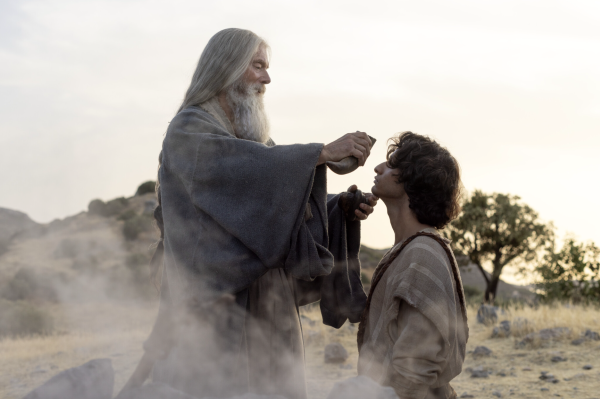Former Atheist Lee Strobel's Follow-Up to Ricky Gervais' Easter Message
In response to Ricky Gervais’ controversial “Holiday Message” last week, one well-known Christian author and apologist followed up with what he’s best known for – the facts.
Presenting his case for Christ, former atheist Lee Strobel described how the evidence of Easter killed his faith in atheism in his essay published in The Wall Street Journal.
Over 30 ago Strobel – who was no stranger to investigating as the legal editor of The Chicago Tribune and an award-winning journalist – began his two-year search for evidence regarding the credibility of Christianity after his wife’s sudden conversion.
Recalling his first reaction to his wife’s newfound belief, Strobel stated in the WSJ how “it was the worst news [he could] get as an atheist.”
“Two words shot through my mind. The first was an expletive; the second was ‘divorce,’” the evangelist relayed.
Afraid she was going to turn into a “self-righteous holy roller,” Strobel decided to systematically investigate Christianity, focusing on Christ’s resurrection, in hopes to perhaps “extricate [his wife] from [the] cult.”
He also admitted to being genuinely curious about her faith because he had seen positive changes in his wife the months following her conversion (which she attributed to God).
Exhaustively studying the historical data surrounding Christ’s death and resurrection for nearly two years, Strobel found evidence after evidence, which supported not only Jesus’ life but his actual resurrection as well.
Recording in the WSJ each criticism he had, the famous author found that all his questions he had regarding Christ’s final days were substantially supported by historical evidence.
Was Jesus really executed, was Jesus’ tomb empty, did anyone see Jesus alive again, and could these encounters have been hallucinations were a few of the questions Strobel investigated and found to be valid.
“One by one, my objections evaporated,” Strobel penned in the WSJ. “I read books by skeptics, but their counter-arguments crumbled under the weight of the historical data. No wonder atheists so often come up short in scholarly debates over the resurrection.
“In the end, after I had thoroughly investigated the matter, I reached an unexpected conclusion: it would actually take more faith to maintain my atheism than to become a follower of Jesus.”
So on November 18, 1981, Strobel made a decision to become a Christian, just like his wife. “My eternity changed and my life changed in ways that I never foresaw,” Strobel told Brian Auten in an interview on Apologetics 315.
“The evidence is what tipped the scales… [I said to myself] ‘If this is true, then Christ deserves my allegiance, my world, my all.’”
Though it was the facts that ultimately led him to take a step in faith, Strobel stated to Auten how his wife’s prayers also seemed to play a big role in his conversion.
Throughout the entire two years he was searching for answers, she – though at first doubtful that her “hardhearted” husband would come to Christ – had through the advice of an older church member prayed Ezekiel 36:26 – “I will give you a new heart and put a new spirit in you; I will remove from you your heart of stone and give you a heart of flesh.”
Oddly enough as well, Strobel mentioned to Auten how he too had prayed as an atheist. Asking God to convince him if he really did exist, he prayed at the beginning of his investigation, “God, I don’t believe you’re there. I’m convinced you’re not. But if you are there, I want to meet you. I want to know you.”
The stakes were too high, the apologist noted. If God did exist, it would change everything.
Now, over three decades later, everything has changed for Strobel. Instead of trying to convince people out of their faith, he is helping lead others to Christ through intellectual and rational evidence and facts.
Writing book after book presenting the evidence for Christ, he seeks to, as an apologist and evangelist, help people come to know God in his own gifted manner.
“My role in the kingdom is, someone with a background as a journalist with law training, to be able to sit down with [scholars] and ask them questions… and then try to force them to the old saying ‘put the cookies on the bottom shelf’ – make the material accessible to average people. Then I try to present it in an unique way that reflects who God’s made me to be and communicate to a larger audience,” Strobel told Auten.
Celebrating his 30th Easter this year as a Christian, Strobel makes his reason for faith clear. “Not because of wishful thinking, the fear of death, or the need for a psychological crutch, but because of the facts,” he concluded.
Advising all unbelievers to study the facts and come to a conclusion, he challenges atheists to: make their investigation a priority, do it with an open heart and mind, and once enough evidence is collected, be willing to reach a verdict.
“Be like an umpire in a baseball game,” he explained to Auten, “who says I’m going to call a ball a ball or a strike a strike, regardless of how it affects the outcome – because that’s the truth.”
Lee Strobel is a New York Times bestselling author and writer of The Case for Christ and The Case for Easter: Journalist Investigates the Evidence for the Resurrection. His latest book, The Ambition, releases May 17.






















